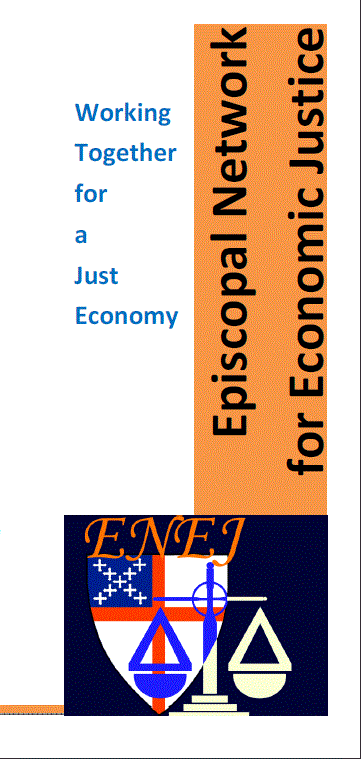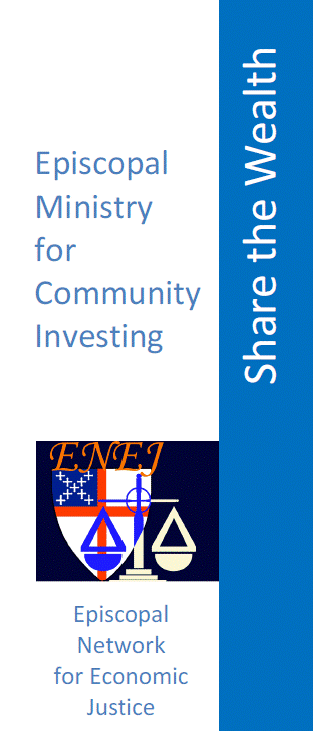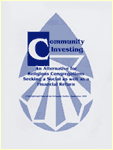
Home
Economic Justice How-To Manual
Economic Justice Education Units
ENEJ Awards
Events
Support ENEJ
ENEJ Donation Form
Advocacy
Globalization
ENEJ Leadership
Publications
Other Resources
Frequently Asked Questions
ENEJ Resources
Economic Justice How-To Manual |
 |
The Episcopal Network for Economic Justice - Brochure....We Believe that the Episcopal Church is called to a ministry of ECONOMIC JUSTICE, which includes but is not limited to, community investment and empowerment; advocacy for worker justice, including the right to organize; and concerns which address the justice issues in the globalization of the economy .....We believe that each diocese should be encouraging and supporting local expressions of this ministry. Both the Gospel and Torah call people of faith to practice economic justice and to sustain justice and equity for all members of the community |
Community Investing: Sharing the Wealth |  |
Community Investing: An Alternative for Religious Congregations Seeking a Social as well as a Financial ReturnThe Episcopal Network for Economic Justice, September 1999. Order from Michael Maloney at meamon@aol.com or download from this site. |
 |
Click here for additional community investing resources
|
“Undocumented” Immigrant Workers in the USA and some Christian Responses |
ENEJ ResourcesAlternative Community Investing and Community Loan Funds Jubilee Ministry: For more information, contact your diocesan Jubilee Ministry Officer or Phoebe Chatfield, Office of Government Relations, Episcopal Church Center, 815 Second Avenue, New York, NY 10017. Economic Justice Loan Committee: Wage Campaigns: www.livingwagecampaign.org Episcopal Relief and Development Fund: Related Web Sites: |
Living Wage/Worker JusticeCenter for Economic and Social Rights The Center for Economic and Social Rights (CESR) was established in 1993 to promote social justice through human rights. In a world where poverty and inequality deprive individuals and entire communities of the opportunity to live in dignity, CESR promotes the universal right of every human being to health and a healthy environment, housing, education, employment, food, and social security. We work for a future where all people can enjoy economic security, social equality, cultural expression, and political freedom. CESR advances this vision by connecting local advocacy to international law mechanisms, and by building public constituencies for human rights. Our largest programs are the Human Rights in the United States Program, which seeks to end domestic poverty through a rights- based framework. The Human Rights and the Environment Program, which seeks to involve local persons in development decisions that affect their environment and currently focuses on access to water as a basic human right, and the Human Rights and Conflict Program, which advocates peaceful alternatives to war and works to protect economic and social rights for people living in areas affected by war, blockades, sanctions, and post-war relief and reconstruction efforts. We have also worked to document and advocate against abuses in the domestic sweatshop system as part of our Workers’ Rights Project. Similarly, we carried out a research project examining the violations of the right to a clean environment in communities along the border with Mexico. We are also working issues related to the right to education, particularly issues of accountability and parental access. We recently published a report on the subject, with close cooperation from the NYU Institute for Education and Social Policy. The following resources are both interfaith sources and community sources for groups and individuals working on the above issues: Let Justice Roll Down: The Living Wage Movement: Related Web SitesFaith-related: Interfaith Worker Justice (IWJ) is a national organization which engages the religious community to support workers' issues in the United States. IWJ works with all religious faiths and traditions on campaigns and issues of importance to low-wage workers in the United States. IWJ has a project (www.CanMyBossDoThat.com) presenting state and federal laws in clear, easy to understand and use information, resources, and tools to enable workers to protect their rights on the job. Community: Economic analysis and up-to-date info: For further information, or to order the video or booklet above, contact The Rev. Canon Dick Gillett, e-mail dgillseattle@yahoo.com. |
Community Organizing for Social and Economic JusticeVirginia Organizing Project Clergy and Laity United for Economic Justice (CLUE) Kentuckians for the Commonwealth Citizen’s Budget Campaign of Western Pennsylvania We monitor and influence legislation and public policy that impacts children and families and provide a network for information exchange on children’s issues for individuals and organizations, maintaining local, state and national links for economic social justice. Acting in the belief that children do not come in pieces but in families, communities and churches, we are promote the Campaign and Act to Leave No Child Behind, a comprehensive legislation for children sponsored by the Children’s Defense Fund, the local Citizen’s Budget Campaign, the National Celebration of Children’s Sabbaths and Parenting for Peace. Southern Appalachian Labor School Cincinnati Interfaith Worker Justice Comm-Org: The On-Line Conference On Community Organizing and Development |
Alternative InvestingCommunity Credit Unions Sue Lloyd, Madison Micro Loan Funds John Gibbs |
Urban Poverty/Urban MinistryThe Rev. Earl Kooperkamp ek320@columbia.edu. Rev. Kooperkamp is associated with HERE, NY Benefit Assistance Fund, the Greater New York Labor and Religion Coalition and the Diocese of new York Economic Justice Commission. The Good Society, Part I: Atlanta The Good Society, Part II: Los Angeles Solving Black Inner-City Poverty |
Economic JusticeEpiscopal Public Policy Network/Washington Office Economic Justice Definition Related Websites: Association for Enterprise Opportunity Committee for Economic and Social Justice National Committee for Jobs and Income Support National Community Capital Association Sabbath Economics Collaborative |
Children’s IssuesWanda Guthrie We monitor and influence legislation and public policy that impacts children and families and provide a network for information exchange on children's issues for individuals and organizations, maintaining local, state and national links for economic social justice. Acting in the belief that children do not come in pieces but in families, communities and churches, we are promote the Campaign and Act to Leave No Child Behind, a comprehensive legislation for children sponsored by the Children's Defense Fund, the local Citizen's Budget Campaign, the National Celebration of Children's Sabbaths and Parenting for Peace. |
Alternative Economic DevelopmentEconomics of Compassion Initiative The Economics of Compassion Initiative of Greater Cincinnati (ECI) grew from the ground up, as more and more groups and individuals indicated strong interest in supporting alterative economic systems, ones in which workers and owners share benefit, in which the community is enhanced and not harmed -- ones marked by justice, community and relationship. |
Alternative Economics TrainingThe ENEJ has contracted with United for a Fair Economy in Boston to develop educational units for use in our parishes and other locales. The following are the titles of each unit: The first six units are completed. Unit 7 will be done soon. United for a Fair Economy (UFE) is prepared to offer training sessions to prepare people to teach these units. The ENEJ hopes to have these sessions offered regionally in the Episcopal Church, with regional sponsorship. Local sponsors can invite people from diocesan economic justice ministries, jubilee centers, parish education programs, and other interested folks. When enough people have been trained around the country, the Church will be in the position to do its own training. For more information on this program, please see the UFE website at: http://www.faireconomy.org/. |
InequalityOxfam The cost of inequality: how wealth and income extremes hurt us all |
ENEJ CommitteesBoard of Directors Capacity Building Committee Communications Committee Education Committee Sue Lloyd |
Debt Relief for Poor CountriesJubilee USA Network |
Corporate ResponsibilityEnvironmental News Network |
Theology of WorkA 50-page position paper on the theology of work has been prepared for the Episcopal Church by the Theology of Work Task Force of the Diocese of Southern Ohio. For an e-mail copy, contact mccoydavid@cs.com |
Fair WagesThe General Convention of 2000, reaffirming a similar resolution in 1997, passsed resolution A081, titled Poverty: National Support for the Implementation of a Just Wage. It urged bishops and leaders within their dioceses “actively to support the ongoing implementation of a living wage within the institutions of the church…and continue to advocate the passage of living wage ordinances at all government levels.” In the Diocese of Los Angeles (whose delegation initiated both resolutions) we have actively pushed for parishes and missions to bring their own employees into compliance with a “living wage” standard, which we derive from the annually updated wage levels stipulated by the City of Los Angeles for those companies and organizations which come under the living wage ordinance the City passed in 1997. That level is $7.99/hr if the company has a health plan for its employees, or $9.24/hr if it does not. (It just went slightly higher for its annual cost of living adjustment.) We say further, in the spirit of that ordinance that churches should apply these wage levels to part time as well as full time employees. We also recognize that in some cases of hardship there will be exceptions; our diocesan resolution (we did one in the diocese before the national church did theirs) is like the national one, not binding. It is important to notes that such wage levels, even if adopted, are far from adequate. A number of studies have concluded that the recommended wage level that would, for example, lift a family of four out of poverty in the U.S. would be about double the federal MINIMUM wage of $5.15/hr, and more. That minimum, even in the poorest state in the union is pathetically inadequate in an economy which has seen the poorer sectors lose ground in the 1990s. Finally, as the General Convention resolutions called for, the living wage movement nationally is taking off. As in other newspapers, so USA Today published a Page 1 story July 23 titled Living Wage Movement Takes Root Across Nation. More than 80 communities across the country have now passed such ordinances, with dozens more pending. If you would like more information on this issue and how churches have responded, I’ll be glad to supply you with it, plus encouragement. (The Rev. Canon) Dick Gillett |
AdvocacyEpiscopal Public Policy Network/Washington Office |
Wealth BuildingCongregations Building Community A Member of the PICO (Pacific Institute for Community Organization) network, this organization is concerned with the treatment of the residents of manufactured home communities. An effort is currently underway to organize a group of manufactured home community residents to buy the park in which they live. For more information about the manufactured home community, its residents and their plans, see www.peoples-homes.com. For information regarding CBC and PICO, see www.piconetwork.org. Fresh Ministries, Jacksonville, Florida, has extensive experience in all aspects of community economic development including business incubators, affordable housing, microenterprise, and other wealth-building strategies. Contact Edye McCown at edye@freshministries.org General ResourcesMicro Enterprise Affordable Housing Credit Union (CDFIs) Individual Development Accounts (IDAs) Community Credit UnionsChattahoochee Valley Episcopal Ministries Episcopal Community Federal Credit Union Community Development Corporations and HousingBethel New Life, Inc. St. Edward’s Redevelopment Corporation Beaver Street Enterprise Center BUILD (Baltimoreans United in Leadership Development) The Clearfork Collaborative and Institute Episcopal Housing Corporation Episcopal Housing Ministry Appalachian Center for Economic Networks Naugatuck Valley Project FreshMinistries, Inc. Center for Community Self-Help Church of Our Saviour Community Development Corporation |
News
79th General Convention
2018 Convention Resolutions
List your Economic Justice Project on the ENEJ Web Site
If you would like to make your local ministry known to the entire national church, please send a brief project description.